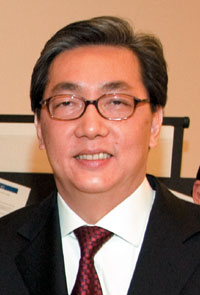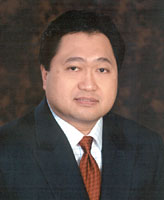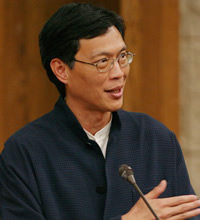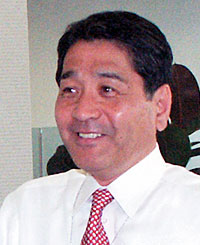Global
Kellogg: Learn from your peers
The advantages of a Kellogg
School education are increasingly apparent given the risks
and complexity of today's markets.
These
alumni leaders tell how they put their degrees to work
around the world
By Matt Golosinski
The stakes
have never been higher, nor the competition and challenges
more formidable in the
arena of global business and politics. Economics may be largely unconstrained by geographic boundaries,
with capital flowing freely across global markets, yet national
political dynamics remain significant. As evidence, one need
only survey the turmoil currently rocking parts of the Middle
East and Central Asia. Or ask Kellogg School alumni Anwar Ul-Haq Ahady ' 83 and
Ali Babacan '92, who are using their leadership skills to
spur economic prosperity in their respective homelands of
Afghanistan and Turkey. Ahady,
Afghan Central Bank governor, works 12-hour days and
more to rebuild the country's banking infrastructure
— no easy task considering the political instability confronting
his efforts, necessitating 10 armed bodyguards and a bulletproof
SUV to get to the office. 1 Yet
his principal defense has been his education. "My [Kellogg]
MBA has helped me a lot in managing the Central Bank, but
I also learned critical thinking from my PhD studies [in
political science at Northwestern University], says Ahady. Babacan too is leveraging his Kellogg School leadership
insights as minister of state for the economy of Turkey.
Though Turkey's business climate is radically different from
that of Afghanistan, religious and economic concerns do rub
shoulders as the country continues to enhance its productivity
and bolster its financial infrastructure. "The multidimensional economic program that Turkey is implementing
has overarching goals to introduce sustainable growth in
the country. The main philosophy of this reform program is
to create an open market economy under the rule of law," says
Babacan. Turkey is undergoing a process of fundamental transformation,
he adds, with its business relations and economic transactions "on
a new dynamic path. Equal to, if not more important than,
the economic reforms, are the political reforms toward full
integration with the European Union," he says. Another Kellogg alum has embarked on a less tumultuous
yet equally daunting task: rebranding an entire country. Somkid
Jatusripitak '84 is Thailand's minister of finance. He
says the insights gleaned during his time in the Kellogg
PhD program play a major part in his marketing strategy for "revitalizing
the economy of Thailand." "The concepts of marketing form the philosophy I use to
drive government policy," says Jatusripitak, who is also
working closely with Kellogg School Dean Dipak C. Jain, an
adviser on foreign affairs to the prime minister of Thailand. "The
'Grand Strategy' I am now building is the strategic roadmap
we have used to illustrate the applications of marketing—to
tackle economic crises—and regain stakeholders' confidence." The
heart of the Grand Strategy, says Jatusripitak, involves "repositioning
Thailand by enhancing its competitive position in the global
market," including restoring external confidence among regional
players such as Indonesia and the Philippines, but also attracting
other international investments.
"Repositioning
is about managing perception," says Jatusripitak. "By investing
in Thailand, investors can set production here and market
to all of Indochina. In addition, goods manufactured in Thailand
can be exported to India and China— So we are positioning
Thailand as another gateway to Asia."
 |
|
© Nathan Mandell
Somkid Jatusripitak '84 |
|
| |
|
A host
of strategic hurdles
While
leaders such as Jatusripitak are making bold moves, they are
doing so in an environment that tests their management and
innovation skills every day.
Threats of global terrorism continue complicating business
and life for millions. The dynamics of global commerce keep
stretching supply chains, offering both advantages and logistical
puzzles. And what began years ago as the migration of manufacturing
jobs from the United States to countries whose regulatory
environment proved attractive for firms, has also become
a threat for thousands of well-paid U.S. software designers
and other high-tech workers.
"There
are a host of strategic and logistical hurdles facing top
corporate executives and senior government administrators,"
says Dean
Jain. "Security, supply chain and branding, for instance,
are only some of the areas requiring special insights. These
are interesting, exciting times that hold much promise but
also considerable risk for those unprepared to meet the customer
needs
of the global market. In our view, the leadership training
that Kellogg delivers is indispensable for navigating the
current economic and political climate."
Among many examples of Kellogg students exercising their
leadership at the intersection of business and politics is
a project called Americans Supporting Iraqi Students. Several
Kellogg students, in conjunction with the Kellogg Center
for Business, Government and Society, have founded AMSIS
to raise $1 million to help rebuild Iraqi schools.
Iraq and many other strategic concerns were a major topic
at the January World Economic Forum (WEF) in Davos. Ranjay
Gulati, the Michael Ludwig Nemmers Distinguished Professor
of Strategy and Organizations at the Kellogg School, attended
and says the WEF's agenda suggests how complex the nexus
of business and government has become.
The framework for WEF this year involved seven threads,
including topics such as ensuring global security, promoting
global growth, managing new risks and spurring innovation. Poverty alleviation that creates jobs, not just takes the
form of fund distribution, was also a central concern for
the WEF this year --- hardly surprising considering the controversy
that continues dogging advocates of globalization. Critics hold globalization accountable for many ills today,
such as the inequality of wealth, exploitation of workers
and environmental deterioration, says Pat Ward '80, managing
director at Goldman Sachs International. Millions
of people are "deeply concerned about the speed
and scope" of globalization, Ward says. "This does not make
them anti-capitalists, because many of their concerns are
important." But
Ward believes globalization is a "force for good" despite
the challenges the model brings. "I am not saying the process of building a global economy
is painless," he says. "More competition is never painless,
and in many ways globalization is simply competition writ
large. Old skills can become worthless overnight, traditional
markets can be lost and tested management techniques can
become obsolete."
Nonetheless,
Ward shares the position of globalization advocates who say
the model is a liberating force that has brought immense benefits
to some of the world's neediest people.
| |
 |
| |
Cesar Purisima '83 |
| |
|
Making
the right moves in Asia and Europe
Regardless
of the ultimate merits of globalization, the realities of
today's international marketplace are driving many firms to
look beyond their home countries for competitive advantage,
producing novel opportunities for leaders capable of managing
the implicit challenges.
Cesar
Purisima '83, secretary of the department of trade
and industry for the Republic of the Philippines, recalls "entering
Kellogg as an accountant." When he graduated, he says, he
had become "a manager of people and resources, enriched with
concepts and wisdom that continue to guide me in my various
leadership positions." These
qualities are playing a major role in his efforts to
craft an export strategy and build a policy and regulatory
environment conducive to investment in the Philippines. He
says that his department's strategies are based on the country's
competitive advantages: "The Philippines is the third-largest
English-speaking country in the world after the United States
and the United Kingdom. It is also blessed with abundant
natural resources," says Purisima. He
believes key sectors that serve as economic strengths
for the Philippines include electronics, which accounts for
two-thirds of Philippine exports, as well as a competitive
IT services industry and a significant mining industry. And
like Thailand, the Philippines offers cargo and delivery
firms what Purisima calls an "ideal gateway" to Asia. Perhaps
most compelling is what he calls the nation's "medical
tourism and retirement services" sector. "Our medical facilities meet world standards, yet are competitively
priced," says Purisima. "We will soon fling our doors wide
open to welcome tourists looking for top-rate medical services
and reasonable terms." Asia continues to attract a lot of attention from disparate
businesses. With enormous potential markets, countries such
as China lure firms to their shores. But China also demands
patience from prospective business partners. UPS,
for instance, though operating in China, is "still
not allowed to have its own entity there," says Ed Buckley
'90, vice president of brand management and customer communications
for the firm. "In China, we currently must work with a partner, and ours
is a state-controlled firm that has partially privatized," explains
Buckley. "What's fascinating is that this same company was
selected to be the partner for other carriers too." Understanding and abiding by the often unfamiliar, even
counterintuitive, regulatory demands of another country is
simply one of the keys to doing business in multiple markets,
says Buckley, who adds that by the end of 2005 UPS will be
eligible to operate its own business in China. "It can be hard to absorb all these unusual circumstances," he
says. "Frankly, there are lots of reasons why they don't
make sense, but to succeed in relationship building and building
your presence in a market you can't let the rules bother
you." Alex
Roth agrees that understanding the dynamics of a particular
market is essential for a firm's global expansion to work.
The 1996 Kellogg School alum and partner at The Monitor Group
says that "there are certain unique elements to servicing
one geography over another." Citing
one instance, Roth notes that for a strategic consultancy
to be successful in Germany, which has one of the largest
consulting markets in the world, "you have to have a meaningful
German delivery capability." For
reasons that include language and work habits, "you
cannot service Germany out of London," says Roth, although "you
can service the Nordics out of London."
Roth's
observation raises a central consideration for firms operating
in multiple countries: to what extent are local solutions
required versus a regional or global overlay? These decisions
have a significant impact on the product, supply chain and
brand management.
 |
|
© Nathan Mandell
Peter Tan '83 |
|
| |
|
For example,
Peter Tan '83, president and CEO of McDonald's Hong Kong,
says that his company's approach to global growth involves
"ensuring the brand's core elements are preserved—while
still incorporating elements of the local market culture,
such as food and ambience."
As
a result, McDonald's does not serve pork in Singapore,
so that Muslims can enjoy the company's food. In India, both
pork and beef are removed from the menu, replaced with the "Maharaja
Mac," a vegetarian version of the Big Mac. Tan
says that globalization should not be "the imposition
of American culture" on the rest of the world. "Our brand
and heritage is as American as it gets, yet we do not think
of ourselves as an American company," he explains. Digital communications continues to propel the nanosecond
culture, says Tan. As a consequence, business, political
and cultural models are forced to change at an unprecedented
rate. "For businesses, the choice of competing locally or globally
is fast disappearing," Tan says. "Whether in production or
as a marketer, the need to become the lowest-cost provider,
as well as being quick to market, requires businesses to
think globally."
Managing
your brand and new businesses
Pressure
to expand, even in a demanding market environment, requires
strategic innovations, such as alliances and product extensions.
At the same time, retaining control of the brand is essential.
| |
 |
| |
Yoichiro
Furuse '70 |
| |
|
For leaders
such as Yoichiro Furuse '70, executive vice president and
CFO of Sanyo Electronic Co., growth includes identifying and
entering new businesses.
He says that Sanyo is eager to enter both the automobile
and housing industries, leveraging its strengths through
strategic alliances that will enable the firm to bring its
expertise in electronics to develop cars equipped with information
technologies and cutting-edge batteries to develop attractive
electric cars. "Likewise, we can use our technologies, such as home network
security systems, to assure comfort and safety of people's
living spaces," says Furuse, who credits his Kellogg School
education --- including the "servant leader" model advocated
by the late Professor Robert
Neuschel --- as instrumental
in his management approach. Furuse also sees a "mountain
of opportunities" for his firm among the aging population,
citing figures by Japan Life Insurance that indicate some
15.6 percent of the world's population by 2050 will be over
the age of 65.
Entering new businesses is something that UPS has already
done, says Buckley. As it has done so, however, a corollary
challenge for the firm has been to communicate its expertise
and presence to customers, something that requires different
strategies depending on the context. For
instance, he says, "Most people in the United States
don't realize that while we have this enormous ground network
of trucks, we are also the 11th largest airline in the world." Similarly,
he notes that UPS also has "a pretty robust
financial services business" and has expanded beyond small
package delivery into overall supply chain management services. Yet,
in the United States at least, Buckley says UPS has had
to extend its brand "a little more slowly and methodically" than
in other locales, since many Americans still primarily identify
the firm as a trucking company. Geographic expansion and new businesses are only two of
the growth options, says Roth, who believes that marketing
and innovation are also key. For
Roth, successful growth includes the human resources
capabilities of the firm. "It's my belief that the human
resources manager must be a critical component of the strategy
team," he says. Because of the complexities of global competition,
firms must increasingly be focused on determining the appropriate
skills and competencies required within the organization
at a given time. Yoshi
Inaba '76, CEO and director of Toyota Motor Sales California,
says human resources are becoming "the major
constraint" on the firm's globalization strategy, impacting
everything from product development, production set up, and
sales and marketing. "The only way to meet these demands is to make the best
use of our local human resources in each market Toyota does
business and to make them bona fide Toyota team members," says
Inaba.
Essential skills to take you anywhere
For
graduates such as Inaba and Wayne P. Borduin '02, senior
finance adviser at ChevronTexaco, their Kellogg experience
has
enabled them to develop communications and leadership skills
essential for today's global marketplace.
"Kellogg's group study method helped me a lot by providing
a perfect way to develop an attitude of listening to what
others have to say, and learning to interact with those who
hold different opinions and value systems," says Inaba. Borduin
agrees: "As evidenced by its collaborative culture,
the diversity of the student body, its high ethical standards
and overall responsiveness to change, Kellogg is the fertile
ground for breeding tomorrow's global business leaders." It's the skills honed at Kellogg that will continue to
enable its alumni leaders to make a difference on the world
stage --- while addressing the challenges of globalization.
"Although I do not have misgivings about
globalization, the leadership of nations needs to do more
to fill the gap between the wealthy and the poor," says
Furuse. "Suppressing the voices of the market will not
bring a constructive solution—but at the same time, governments
and corporations must work together to protect the environment—and
improve the living standard that brings hope for the whole
population."
Footnote:
1 On extended leave from his role as a professor
of political science at Providence College in Rhode Island,
Ahady was unavailable for an interview given the demands
of his current responsibilities. However, he did speak with Northwestern
Magazine last fall in an article written by Katherine
Leal Unmuth, from which these details come.
|



